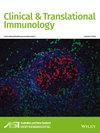Enhancing CAR T-cell therapy manufacturing efficiency through semi-automated bioprocessing
Abstract
Objectives
Chimeric antigen receptor (CAR) T-cell therapies have revolutionised the treatment of blood-based malignancies. The use of manual CAR T-cell manufacturing methods is one of the challenges that contributes to these delays. As CAR T therapy emerges as a potential first- or second-line treatment option for these cancers, the demand for these therapies continues to rise. However, challenges persist in ensuring that the patients who need these therapies receive them in a timely manner. Automated CAR T-cell manufacturing methods that use software to control the equipment used in the process can help overcome the roadblocks associated with manual manufacturing, ultimately enabling a reduction in variability, increased efficiency, improved product quality and better data management. This paper aims to present an end-to-end semi-automated methodology for manufacturing CAR T cells using the Cell Therapy Systems (CTS™) Cellmation software – an off-the-shelf software solution – to control physically connected modular cell therapy instruments that eliminates the roadblocks associated with manual manufacturing.
Methods
T cells from healthy donors were isolated and processed into CAR T cells using a semi-automated, connected, multi-instrument setup that leveraged electroporation and a CRISPR/Cas system for delivering the CD19-CAR construct to the T cells. Flow cytometry was used to assess cell type composition, cell viability and expression of T-cell activation markers throughout the process. We also measured exhaustion marker expression on T cells, T-cell receptor (TCR) knock-out, CAR knock-in and cytotoxic activity against NALM6 cells.
Results
The results demonstrated the successful generation of functional CAR T cells using a semi-automated instrument workflow. The results were similar to the results from CAR T cells manufactured using non-automated processes; however, the successful connection and control of the instruments using automated software present an exciting opportunity for process developers and manufacturers who want to reduce manual touchpoints in their cell therapy manufacturing process.
Conclusion
The method that we describe in this paper could be beneficial to process development and manufacturing teams that might require flexibility in their CAR T cell manufacturing workflow and want to take advantage of modular systems that can be automated using the Cellmation software to reduce the problems associated with manual handling.


 求助内容:
求助内容: 应助结果提醒方式:
应助结果提醒方式:


